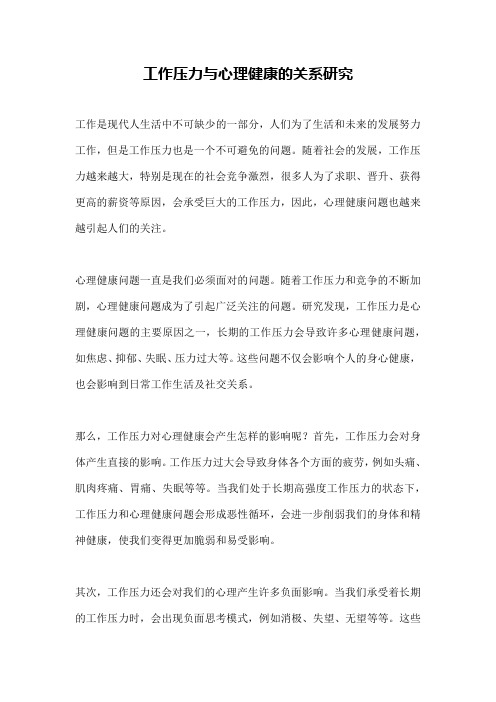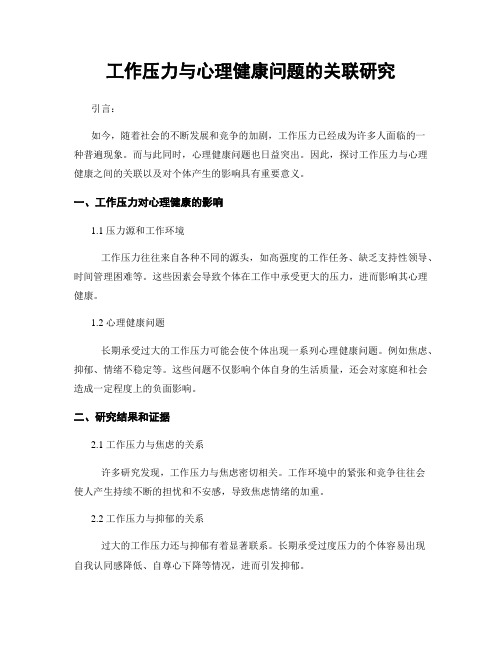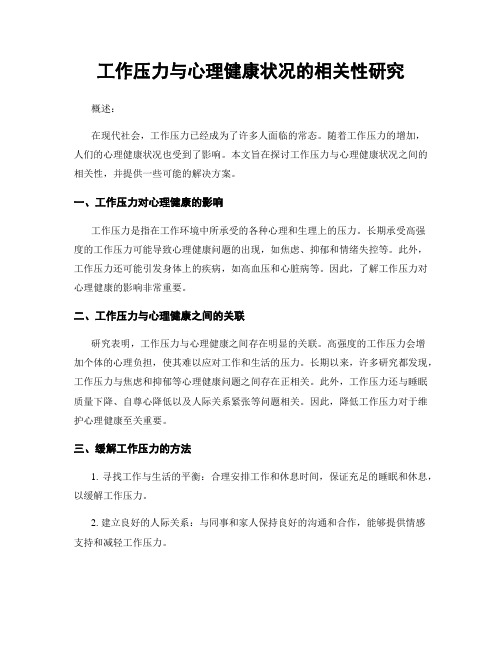工作中的工作压力和心理健康之间的关系【外文翻译】
工作压力与心理健康的关系研究

工作压力与心理健康的关系研究工作是现代人生活中不可缺少的一部分,人们为了生活和未来的发展努力工作,但是工作压力也是一个不可避免的问题。
随着社会的发展,工作压力越来越大,特别是现在的社会竞争激烈,很多人为了求职、晋升、获得更高的薪资等原因,会承受巨大的工作压力,因此,心理健康问题也越来越引起人们的关注。
心理健康问题一直是我们必须面对的问题。
随着工作压力和竞争的不断加剧,心理健康问题成为了引起广泛关注的问题。
研究发现,工作压力是心理健康问题的主要原因之一,长期的工作压力会导致许多心理健康问题,如焦虑、抑郁、失眠、压力过大等。
这些问题不仅会影响个人的身心健康,也会影响到日常工作生活及社交关系。
那么,工作压力对心理健康会产生怎样的影响呢?首先,工作压力会对身体产生直接的影响。
工作压力过大会导致身体各个方面的疲劳,例如头痛、肌肉疼痛、胃痛、失眠等等。
当我们处于长期高强度工作压力的状态下,工作压力和心理健康问题会形成恶性循环,会进一步削弱我们的身体和精神健康,使我们变得更加脆弱和易受影响。
其次,工作压力还会对我们的心理产生许多负面影响。
当我们承受着长期的工作压力时,会出现负面思考模式,例如消极、失望、无望等等。
这些负面思考会让我们感到越来越沮丧,从而对我们的生活和工作产生不良影响。
如果长期处于这种状态下,会导致心理问题日积月累,对智力和情感造成负面影响,进而影响到我们的个人生活以及社交关系。
应该如何处理工作压力和维持好心理健康问题呢?首先,减少工作压力是最重要的。
我们能够从职业规划、工作自我管理、时间管理等方面入手,系统地学习如何有效地处理工作压力。
其次,充分休息和锻炼身体,保持理性的情感状态也是维持心理健康的重要方法。
此外,找到与自己交谈的人,分享内心的感受,能够更好地理解和支持自己,这也是重要的应对方法。
总之,工作压力对心理健康问题有很大的影响,它不仅可能导致身体疲劳,也会对心理状态产生消极影响。
因此,我们应该努力克服工作压力,维持身体与心理的稳定,尽力保持一个良好的心理状态,从而更好地面对工作、学习和生活的挑战。
工作压力与心理健康问题的关联研究

工作压力与心理健康问题的关联研究引言:如今,随着社会的不断发展和竞争的加剧,工作压力已经成为许多人面临的一种普遍现象。
而与此同时,心理健康问题也日益突出。
因此,探讨工作压力与心理健康之间的关联以及对个体产生的影响具有重要意义。
一、工作压力对心理健康的影响1.1 压力源和工作环境工作压力往往来自各种不同的源头,如高强度的工作任务、缺乏支持性领导、时间管理困难等。
这些因素会导致个体在工作中承受更大的压力,进而影响其心理健康。
1.2 心理健康问题长期承受过大的工作压力可能会使个体出现一系列心理健康问题。
例如焦虑、抑郁、情绪不稳定等。
这些问题不仅影响个体自身的生活质量,还会对家庭和社会造成一定程度上的负面影响。
二、研究结果和证据2.1 工作压力与焦虑的关系许多研究发现,工作压力与焦虑密切相关。
工作环境中的紧张和竞争往往会使人产生持续不断的担忧和不安感,导致焦虑情绪的加重。
2.2 工作压力与抑郁的关系过大的工作压力还与抑郁有着显著联系。
长期承受过度压力的个体容易出现自我认同感降低、自尊心下降等情况,进而引发抑郁。
2.3 工作满意度和心理健康研究还表明,工作满意度与个体的心理健康密切相关。
对于那些对自己的工作满意度较高的人来说,他们在面对工作压力时更容易保持积极乐观、应对良好。
三、缓解工作压力、促进心理健康的建议3.1 调整工作态度具有正确的工作态度和价值观是缓解工作压力、保持心理健康的基础。
接受挑战、培养积极心态,以及保持良好的工作和生活平衡等都有助于减轻压力。
3.2 增加社会支持社会支持是缓解工作压力的重要因素之一。
在面对挑战时,与家人、朋友、同事进行交流和分享可以有效地减轻心理负担。
3.3 积极应对压力个体应该学会合理应对工作压力,如通过锻炼、休息调整等方式来缓解紧张情绪,并寻求专业心理咨询和帮助。
结论:工作压力与心理健康问题之间存在着明显的关联。
长期承受过大的工作压力可能导致焦虑、抑郁等心理健康问题。
工作压力与心理健康状况的相关性研究

工作压力与心理健康状况的相关性研究概述:在现代社会,工作压力已经成为了许多人面临的常态。
随着工作压力的增加,人们的心理健康状况也受到了影响。
本文旨在探讨工作压力与心理健康状况之间的相关性,并提供一些可能的解决方案。
一、工作压力对心理健康的影响工作压力是指在工作环境中所承受的各种心理和生理上的压力。
长期承受高强度的工作压力可能导致心理健康问题的出现,如焦虑、抑郁和情绪失控等。
此外,工作压力还可能引发身体上的疾病,如高血压和心脏病等。
因此,了解工作压力对心理健康的影响非常重要。
二、工作压力与心理健康之间的关联研究表明,工作压力与心理健康之间存在明显的关联。
高强度的工作压力会增加个体的心理负担,使其难以应对工作和生活的压力。
长期以来,许多研究都发现,工作压力与焦虑和抑郁等心理健康问题之间存在正相关。
此外,工作压力还与睡眠质量下降、自尊心降低以及人际关系紧张等问题相关。
因此,降低工作压力对于维护心理健康至关重要。
三、缓解工作压力的方法1. 寻找工作与生活的平衡:合理安排工作和休息时间,保证充足的睡眠和休息,以缓解工作压力。
2. 建立良好的人际关系:与同事和家人保持良好的沟通和合作,能够提供情感支持和减轻工作压力。
3. 学会放松和调节情绪:通过参加运动、练习冥想和深呼吸等活动,可以帮助释放紧张情绪,缓解工作压力。
4. 寻求专业帮助:如果工作压力长期无法缓解,可以考虑咨询心理学专家,寻求专业的帮助和支持。
结论:工作压力与心理健康状况之间存在明显的相关性。
了解和缓解工作压力对于个体的心理健康至关重要。
通过寻找工作与生活的平衡、建立良好的人际关系、学会放松和调节情绪以及寻求专业帮助等方法,可以有效地减轻工作压力,提升心理健康水平。
在未来的研究中,我们还可以进一步探索工作压力对心理健康的具体机制,以及制定更加个性化的干预措施,为人们提供更好的心理健康支持。
健康心理学外文文献翻译

Collaborative Relationships: School Counselors andNon-School Mental Health Professionals WorkingTogether to Improve the Mental Health Needs ofStudents浅议基于合作关系的学校辅导员和非学校的心理健康专家对学生心理健康需要的改善作用Chris Brown, Ph.D.David T. DahlbeckLynette Sparkman Barnes摘要:本研究调查了53名受聘于各初中、高中的辅导员和管理员关于他们对校内与校外心理健康专家协同工作来回应学生的心理健康需求的看法。
除此之外,本研究还试图了解学校辅导员和学校校长或副校长是如何看待学校辅导员的角色、职责以及对学校辅导员培训的范围。
正文:为了努力提供一系列广泛的服务来帮助学生处理他们带进课堂的社交及情绪问题,学校和社会心理健康机构已经开始实施合作伙伴关系(Walsh & Galassi, 2002)。
沃尔什和加拉西断言,如果我们想要成功的使结构复杂的校内和校外儿童生活产生交叉,我们就必须以整个儿童的发展为重点。
这样做将需要“跨越专业和机构界限的合作”。
体现着学校与社区心理健康机构建立伙伴关系的扩展的学校心理健康计划在美国有不断发展的倾向。
在这些计划中,学校聘请的心理健康专业人员在强调有效地预防、评估和干预方面提供了无数的服务(Weist, Lowie, Flaherty, & Pruitt, 2001)。
这项合作活动是为了减轻教育系统的负担和责任,同时提高了服务的零散和不完整传递给适龄儿童和青年。
研究表明,在申请心理健康服务的年轻人中只有不到三分之一的人得到了他们所需要的关心(美国卫生与人类服务部,1999)。
考虑到提高儿童与青少年心理健康的多系统协作的重要性和认可度,这些合作伙伴关系的知觉功效就是这项调查议程的驱动力。
心理健康与工作压力的关系研究

心理健康与工作压力的关系研究在现代社会,工作压力成为了许多人面临的常态。
人们常常被要求在快节奏的工作环境中追求更高的产出和更好的表现,这对心理健康产生了一定的影响。
本文将探讨心理健康与工作压力之间的关系,并提供一些应对工作压力的方法。
一、工作压力对心理健康的影响工作压力对心理健康产生了广泛的影响。
首先,持续的工作压力会导致焦虑和紧张。
当人们在工作中感到压力过大时,常常会面临与工作相关的忧虑和恐惧,这些情绪会加剧他们的紧张感,从而对心理健康产生负面影响。
其次,工作压力也容易引发抑郁。
长期承受来自工作的压力会导致个体情绪低落、心情沮丧,进而可能发展为抑郁症。
抑郁症对个体的日常生活和工作能力造成了严重的负面影响,甚至可能导致个体产生自杀念头。
此外,工作压力还会对个体的身体健康造成伤害。
一些研究发现,持续的工作压力与患心脏病、高血压等疾病之间存在一定的关联。
工作压力会导致心脏负荷加重、免疫力下降等生理反应,从而增加了患病的风险。
二、应对工作压力的方法虽然工作压力会对心理健康产生负面影响,但我们可以采取一些方法来应对这种压力,保护自己的心理健康。
首先,建立积极的心态是应对工作压力的关键。
我们要对工作保持一种积极乐观的态度,如将工作看作是个人发展的机会,将挑战视为改善自己的机会,这样有助于缓解工作压力对心理健康的负面影响。
其次,合理安排工作和生活的平衡也是重要的。
我们应该学会分配时间和精力,兼顾工作和生活的需求。
定期休息、参加娱乐活动、与家人朋友交流等都是保持身心愉悦的帮助。
此外,积极寻求支持也是缓解工作压力的重要途径之一。
与同事、家人或朋友进行交流,分享自己的困扰和压力,不仅能获得理解和鼓励,还可以得到一些建设性的建议和帮助。
最后,培养良好的心理调适能力也是应对工作压力的重要手段。
我们可以通过运动、冥想、放松训练等方式来调整自己的心态,缓解工作压力带来的负面影响。
总结:心理健康与工作压力存在密切的关系。
持续的工作压力会对个体的心理健康产生负面影响,包括焦虑、抑郁和身体健康问题。
心理健康与工作压力

心理健康与工作压力工作压力是现代社会中普遍存在的现象,每个人都无法完全避免。
然而,良好的心理健康是我们在面对工作压力时所必需的。
本文将探讨心理健康与工作压力之间的关系,并提供一些应对工作压力的方法。
一、心理健康对工作压力的影响心理健康是指个体心理状态的良好程度,包括情绪稳定、适应力强、自我认知清晰等方面。
心理健康状况对工作压力有着直接的影响。
一个心理健康良好的人,能更好地应对工作压力,保持积极的态度和高效的工作状态。
相反,心理不健康的人可能会因为工作压力而产生焦虑、抑郁等负面情绪,甚至可能导致心理疾病的出现。
二、应对工作压力的方法1. 建立良好的工作与生活平衡工作和生活之间的平衡对于维持心理健康起着重要作用。
我们应确保在工作之余有足够的时间去放松自己,参与一些喜欢的爱好活动,和家人朋友进行沟通交流。
只有将工作与生活分开,才能更好地缓解工作压力。
2. 学会有效的时间管理时间管理是有效应对工作压力的关键。
制定合理的工作计划,并设定明确的目标和时间表,激励自己按计划完成任务。
避免临时抱佛脚、过度加班等不科学的工作方式,保证自己有足够的时间去休息和放松,提高工作效率。
3. 培养健康的生活习惯养成健康的生活习惯对心理健康至关重要。
保持充足的睡眠和均衡的饮食,适当参加体育锻炼,都能增强身体素质和抵抗力,帮助我们更好地应对工作压力。
4. 沟通与协调与同事和上级进行积极的沟通与协调,能够促进工作的顺利开展,减轻个人的工作压力。
通过与他人分享和借鉴经验,我们可以更好地解决工作中遇到的问题,提高工作效率。
5. 学会放松适当的放松对于心理健康的维护至关重要。
我们可以通过多种方式来放松自己,如听音乐、看电影、阅读等,让大脑得到休息和放松,恢复精力,更好地应对工作的挑战。
结论心理健康与工作压力之间存在密切的关系。
一个良好的心理健康状况能够帮助我们更好地应对工作压力,提高工作效率。
因此,我们应该重视心理健康的培养和维护,采取积极的方法来应对工作压力,保持良好的心理状态。
工作压力与心理健康

工作压力与心理健康近年来,随着社会经济的快速发展和竞争的加剧,越来越多的人在工作中面临着巨大的压力。
工作压力不仅会影响到人们的身体健康,还会对心理健康产生重要影响。
在这篇文章中,我们将探讨工作压力与心理健康之间的关系,并提出一些有助于缓解工作压力的方法。
一、工作压力对心理健康的影响工作压力不仅仅是一种来自工作量的压力,还包括来自工作环境、上级要求、职业发展等方面的心理压力。
长期承受高强度的工作压力会导致心理健康问题的产生,如抑郁、焦虑、失眠等。
一项研究发现,80%的工作人群存在因工作压力引起的不同程度的心理问题。
工作压力对心理健康的影响有以下几个方面:1.情绪波动:工作压力会导致情绪波动,使人容易疲劳、烦躁、易怒甚至抑郁。
这些情绪问题会进一步影响到人的工作效率和工作质量。
2.身心疲惫:长时间承受高强度的工作压力会导致身心疲惫,使人感到疲惫不堪,精力不集中,影响到工作效果。
3.人际关系紧张:工作压力还会对人际关系产生负面影响。
在高压力的工作环境中,人们常常因为竞争、冲突等问题而与同事关系紧张,甚至会出现人际交往障碍。
4.生活质量下降:工作压力过大会使人无法平衡工作和生活,长期下去,生活质量会下降,甚至会出现身体健康问题。
二、缓解工作压力的方法面对工作压力对心理健康的影响,我们可以采取一些有效的办法来缓解压力,维护心理健康。
1.合理规划工作:合理规划工作内容和时间,制定工作计划,合理安排工作任务,避免任务过于集中和超负荷工作。
2.调整心态:积极调整自己的心态,学会面对工作压力和挑战,培养良好的心理素质。
可以通过学习心理疏导技巧,提高心理抗压能力。
3.规律作息:保持规律的作息时间,足够的睡眠可以帮助身心恢复,提高工作效率。
4.适量运动:适量的身体运动可以释放压力,有助于心情舒畅和身心健康。
5.寻找支持:在工作中遇到困难时寻求合适的支持,可以与家人、朋友或同事交流,寻求理解和建议。
6.培养兴趣爱好:利用休息时间培养自己的兴趣爱好,放松心情,转移注意力。
心理健康与工作压力的关系研究

心理健康与工作压力的关系研究工作是现代人生活中不可或缺的一部分,每个人都会面临一定的工作压力。
然而,这种压力对心理健康会有什么影响呢?本文将探讨心理健康与工作压力之间的关系,并提供一些减轻工作压力的方法。
一、心理健康的重要性心理健康是指一个人在心理上的稳定与平衡。
拥有良好的心理健康对于个人的生活质量至关重要。
它能够影响个人的情绪、情绪反应和行为举止,进而对人际关系、工作效率及生活满意度产生影响。
因此,我们需要关注自己的心理健康,并寻求适当的方式来保持其稳定。
二、工作压力的定义与来源工作压力是指来自工作环境和工作任务的心理压力。
现代社会中,人们面临的工作压力越来越大。
工作压力可能来源于以下几个方面:高工作负荷、工作时间不确定性、工作环境不友好、缺乏控制权、冲突和竞争等。
这些因素可能对个人的心理健康产生负面影响。
三、心理健康与工作压力的关系研究发现,工作压力与心理健康之间存在密切关系。
过高的工作压力可能导致心理健康问题,如焦虑、抑郁和工作压力症等。
长期处于高压工作环境中的人,往往容易出现各种心理健康问题,甚至对身体健康也产生负面影响。
因此,我们需要认识到工作压力对心理健康的影响,采取措施减轻工作压力。
四、减轻工作压力的方法1. 找到适合自己的工作与生活平衡。
合理安排工作时间,保证自己有足够能量去应对工作压力。
2. 学会放松和自我调节。
可以通过体育运动、音乐、阅读等方式,寻找自己的解压方式,舒缓工作带来的压力。
3. 与他人进行交流。
与家人、朋友或同事交流,分享彼此的压力和困扰,寻求帮助和支持。
4. 培养良好的职业素养。
通过学习和提升自己的职业能力,增强自信心和应对压力的能力。
5. 寻求专业帮助。
如果感到工作压力超过自身承受能力,应及时寻求心理咨询师或医生的帮助。
总结:心理健康与工作压力密不可分,过高的工作压力会对心理健康产生负面影响。
因此,我们需要关注并重视自己的心理健康,采取适当的方法来减轻工作压力。
- 1、下载文档前请自行甄别文档内容的完整性,平台不提供额外的编辑、内容补充、找答案等附加服务。
- 2、"仅部分预览"的文档,不可在线预览部分如存在完整性等问题,可反馈申请退款(可完整预览的文档不适用该条件!)。
- 3、如文档侵犯您的权益,请联系客服反馈,我们会尽快为您处理(人工客服工作时间:9:00-18:30)。
外文翻译原文The Relationship between Job Stress and Mental Health at Work Material Source:Industrial Health 1997, 35, 29-35 Author:Jun Shigemi, Yoshio Mino, Toshihide Tsuda, Akira Babazono and Hideyasu Aoyama Selyel defined stress as the state manifested by a specific syndrome which consists of all the nonspecifically induced changes within a biologic system. Using an experimental study, he proved that stress induces a common pathological change which he called "general adaptation syndrome." He did not specify the character of stress. Stress which was comfortable to the individual and essential for development and growth was called eustress, while stress which was unpleasant or harmful to the individual was called distress.Holmes and his collaborator weighted and scored stressful life events. They proved that severe health impairment is likely to occur if people have severe stressful life events and if the life events score exceeded 300 points in the previous year. Nevertheless, it was reported that there was only a weak relationship between the strength of stress and the incidence of psychiatric or somatic diseases. Knowing these facts, researchers attempted to identify other stress factors which affected psychiatric or somatic diseases.Lazarus and his collaborators reported that the daily hassles of living having continuous and chronic characteristics are a significant stress. These "daily hassles" appeared to be better predictors of health outcomes than life events. Recently, the causal relationship between job stress and psychiatric illness or cardiovascular disease was studied. The job-demand-control-support model suggests that psychological strain and subsequent somatic diseases resulted from the interaction of three types of job characteristics: job demand, job decision latitude, and work related social support. In Japan, causal relationship between job stress and mental health has been drawing the attention of researchers who are currently studying job stress. Therefore, the study of job stress is important to develop strategies for the prevention of stress related diseases and for health promotion. However, the relationship between job stress and problematic mental health state has not beenestablished in Japan. We hypothesized that adverse effects of subjective job stress on mental health state is great, and we estimated that some types of prevalence odds ratios between job stress and mental health would be more than two. The purpose of this study is to clarify the relationship between job stress and problematic mental health state quantitatively using prevalence odds ratios.A cross-sectional study was performed using a self-administered questionnaire given to the employees of an electric company in Okayama city, Japan. All subjects were workers producing minute electric parts. We selected this company because of its different work places, which allowed us to examine the characteristics of workers more precisely. Among 782 workers, 763 responded to the questionnaire satisfactorily. The response rate was 97.6%. The questionnaire consisted of demographic questions such as gender, age, marital status, and employment section as well as questions taken from the Japanese version of the 30-item General Health Questionnaire (GHQ) , and a questionnaire about subjective job stress developed by Uehata et al. We added questions about satisfaction with family life and physical health states.We used the 30 item Japanese version of the GHQ as a measure of the mental health state. A cut-off score of 718 points using GHQ method was considered reasonable in Kitamura's study on the validity of the 30-item GHQ. Therefore, we defined response showing a GHQ score of 8 points or more as representing individuals with problematic mental health states, and responses showing 7 points or less as representing individuals without any mental health problems.We treated the items of physical health status and satisfaction with family life as categorical data. We weighted two points on individuals who answered "very healthy" or "healthy," weighted one points on individuals who answered "ordinary" and weighted zero points on individuals who answered "not healthy so much" or "not healthy." We weighted two points on individuals whose answers were "dissatisfied very much" or "dissatisfied" and weighted one point on individuals whose responses indicated neither satisfied nor dissatisfied, and zero points on individuals whose answers were "very satisfied" or "satisfied." We employed a multiple logistic regression model controlling for potential confounding factors: gender, age, marital status, satisfaction with family life, and physical health state.In the logistic regression model, we used all items of subjective job stress in spite of the high value of the alpha coefficient, because we thought that the interrelationship between subjective job stress and problematic mental health stateshould be analyzed with respect to every item of subjective job stress. Adjusted odds ratio and 95% confidence intervals for the odds ratios of each level of subjective job stress to mental health state were calculated.Although we thought that sex was a potential confounding factor, sex was not a significant variable in the multiple logistic regression analysis. Crude data analysis between subjective job stress and GHQ score showed same tendency by each sex.In the correlation matrix coefficients of the logistic regression model, marital status showed a strong negative correlation (more than 0.5 in absolute value) to the subgroups with age range of 30-39 years and 40-49 years. Then, we excluded the variable regarding marital status from the multiple logistic regression model because of its multicollinearity.In our study, the proportion of individuals with problematic mental health state was 37.8% in the total subjects, 41.7% in males and 34.3% in females. Iwata reported on the prevalence of depressive symptoms in a Japanese tax office using the Japanese version of the Center for Epidemiologic Studies Depression Scale. He found that 15.2% of males and 10.6% of females had high levels of depressive symptoms. Our study measured problematic mental health states by use of the GHQ. We could detect the cases from the GHQ more than cases of depressive symptoms and then our concept of problematic mental health state was broader than Iwata's depressive symptoms. Therefore, our prevalence was higher than depressive symptom.This study investigated the relationship between subjective job stress and problematic mental health state. Therefore, we used multiple logistic regression to estimate quantitative measures of subjective job stress and problematic mental health state, adjusted by potential confounding factors of gender, age, satisfaction with family life and physical health state. Our results showed that the items related to subjective job stress because of "too much trouble at work," "too much responsibility," "poor relationship with superiors," "are not allowed to make mistakes" and "cannot keep up with new technology" were related to mental health state. Consequently, it is suggested that subjective job stress can be harmful to a worker's mental health state and cause "distress," which was caused by an injury from the nonspecific response of a living body to negative stimuli, according to Selye.We recognized that interpersonal conflict between the worker and his superiors might be an important risk factor for mental health in our cross-sectionalstudy. In the model of National Institute for Occupational Safety and Health, this type of interpersonal conflict is involved in job stressors. Therefore, cooperative relationships with superiors and colleagues as job support might be important in maintaining healthy mental state. Our study suggests that "Cannot keep up with new technology" is another risk factor for mental health, especially in male workers. In Japanese industries such as electrical factories, workers are placed in highly automated circumstances. Therefore, work related to highly developed technology might be a source of job stress.Our quantitative estimation of job stress might have under or over-estimated the magnitude of job stress because job stress may be affected by familial stress. Therefore, we hypothesized multiplicative interaction between subjective job stress and feeling of dissatisfaction with family life, and analyzed the logistic regression using an interaction model. Adjusted odds ratio with interaction between subjective job stress and mental health showed the quantitative measure of multiplicative terms between job stress and familial stress and those interaction terms. But the positive multiplicative interaction model was not significant. From another point of view, there was a space to analyze the additive interaction model.The purpose of this study is to clarify the relationship between subjective job stress and mental health. From the result of the multiple logistic regression analysis controlling confounding factors, some kinds of subjective recognition of job stress were shown to possibly be related to problematic mental health state because of the more than double degrees of prevalence odds ratio. Accordingly, our prevalence odds ratios with values above double would have more than 50% of attributable proportion in the causal inference between subjective job stress and problematic mental health state. Therefore, further studies to clarify causal relationship between job stress and mental health are required to prove it.译文工作中的工作压力和心理健康之间的关系资料来源:产业健康,1997年,35期,29-35页作者:Jun Shigemi, Yoshio Mino, Toshihide Tsuda, Akira Babazono and Hideyasu Aoyama 赛亚将压力定义为一个特定的综合征,包括引起生物体系内的非特异性的变化。
